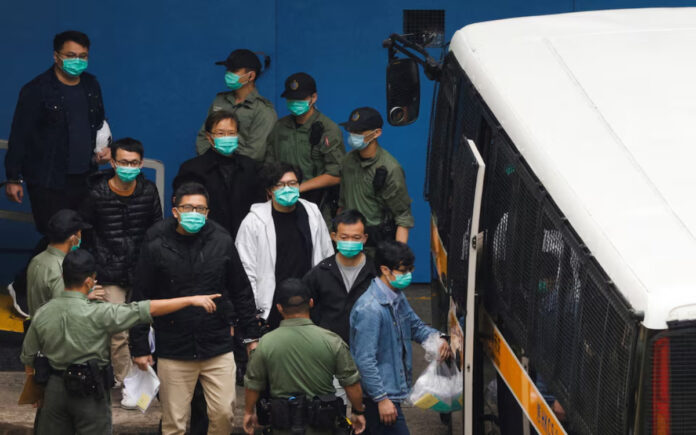Hong Kong: A Hong Kong court is set to sentence 45 pro-democracy campaigners this week in a landmark national security trial. Critics argue the expected heavy sentences could further erode the city’s vibrant pro-democracy movement.
The trial has been a prolonged legal battle, with 14 of the 47 charged found guilty in May for conspiracy to commit subversion. Two were acquitted, while 31 had earlier pleaded guilty, hoping for reduced sentences.
The U.S. has labeled the trial as “politically motivated” and called for the defendants’ release. In contrast, Hong Kong authorities have defended the process, dismissing foreign criticism as “baseless” and “malicious smearing.”
The sentencing, scheduled for Tuesday, will be delivered by three national security judges selected by the government. Jail terms are anticipated to range from several years to life imprisonment for the most significant offenders.
The Charges and Their Impact
The charges stem from unofficial primary elections held in July 2020, aimed at increasing the democrats’ chances in an upcoming legislative council election. The case has effectively dismantled the pro-democracy camp, silencing prominent voices.
“This case has swept away the entire pro-democracy camp in Hong Kong,” said Emilia Wong, girlfriend of defendant Ventus Lau.
The trial reflects broader concerns over the erosion of freedoms under the “one country, two systems” framework established when Hong Kong returned to Chinese rule in 1997. Critics argue this framework has been undermined since Beijing imposed a national security law in July 2020, following mass pro-democracy protests in 2019.
Personal Stories and Social Costs
Families and friends of the defendants have expressed mixed feelings, with some relieved the sentencing phase will finally conclude the prolonged ordeal. For many, the process has taken a toll on mental and physical health.
Eddie Chu, a former journalist and defendant, now suffers from glaucoma, which has affected his vision and mood, said his friend Debby Chan. Winnie Yu, another defendant, chose not to plead guilty despite low chances of acquittal, a decision her husband John described as a testament to her principles.
Also Read | Britain Pushes for Sudan Peace Resolution at UN Security Council Vote
“Stick to our beliefs, don’t change our thoughts easily because of others, be ourselves,” John said.
Legal and Social Implications
Legal experts have highlighted deviations from common law traditions, including the denial of bail and jury trials for the defendants.
“The 47 democrats verdict makes crystal clear that any such compatibility with human rights or the rule of law stops at the all-important legislative purpose of the national security law as a means to protect national security,” said Urania Chiu, a legal researcher at Oxford University.
Also Read | Biden Administration Approves Ukraine’s Long-Range Strikes Inside Russia
China defends the national security law as essential to restoring order after the 2019 protests. However, critics like Sarah Brooks of Amnesty International see parallels between these trials and subversion cases in mainland China.
“Opposition is seen as dissent… That is a remarkable about-face for Hong Kong,” Brooks said.
Chan, a friend of Eddie Chu, noted that while public dissent is suppressed, the desire for democracy persists privately. “The democratic movement in Hong Kong has now become invisible,” she said, adding it has “taken on another meaning and form.”



